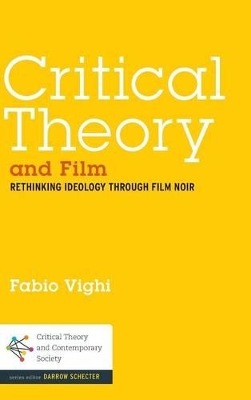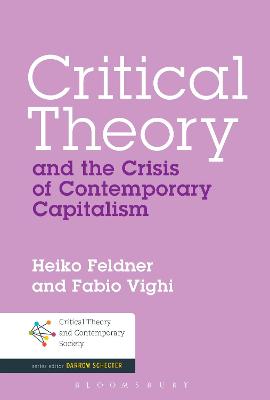Critical Theory and Contemporary Society
2 total works
Critical Theory and Film brings together critical theory and film to enhance the critical potential of both. The book focuses on the Frankfurt School, most notably the works of Adorno and Horkheimer, as well as associated thinkers.It seeks to demonstrate that cinema can help critical theory repoliticize culture and society and affirm the theoretical and political impact of cinematic knowledge. After discussing how the Frankfurt School saw cinema as an instrument of capitalism use to promote the cultural and political regimentation of the masses, Vighi then proceeds to demonstrate that critical theory can in fact suggest a different verdict on the progressive potential of cinema. Each chapter focuses on a key critical theory concept that is explained and redefined through film analysis to unravel the hidden presuppositions and most radical consequences of critical theory. A unique contribution to the literature, this volume in the Critical Theory and Contemporary Society series offer an innovative reading of film as a critical tool, drawing on the latest developments in Lacanian theory.
Critical Theory and the Crisis of Contemporary Capitalism
by Heiko Feldner and Dr. Fabio Vighi
Published 14 May 2015
This volume reassesses the nature of the current global economic crisis and its implication for the 21st century, through the unique lens of Marx's theory of the value-form as the unconscious matrix of modern society.
Going beyond orthodox Marxist and postmodernist accounts, the author offers fresh new readings of Marx, Benjamin, Foucault, and Žižek. Here he argues that capitalism has not only entered its greatest crisis since WWII, but has in fact reached its historical limit and is in terminal decline. In this light, the book seeks to answer how a rerun of Keynesian regulations could possibly resolve the crisis. It also inquires as to whether a Green New Deal might succeed when the gap between work to be had and work to be done widens, and what alternatives neo-Marxian approaches offer considering the failure of Marxism in the 20th century.
This far-reaching, critical examination of the crisis not only builds on critical theory, but also offers new readings of key theorists that will appeal to anyone interested in political theory, critical theory, and political economy.
Going beyond orthodox Marxist and postmodernist accounts, the author offers fresh new readings of Marx, Benjamin, Foucault, and Žižek. Here he argues that capitalism has not only entered its greatest crisis since WWII, but has in fact reached its historical limit and is in terminal decline. In this light, the book seeks to answer how a rerun of Keynesian regulations could possibly resolve the crisis. It also inquires as to whether a Green New Deal might succeed when the gap between work to be had and work to be done widens, and what alternatives neo-Marxian approaches offer considering the failure of Marxism in the 20th century.
This far-reaching, critical examination of the crisis not only builds on critical theory, but also offers new readings of key theorists that will appeal to anyone interested in political theory, critical theory, and political economy.

